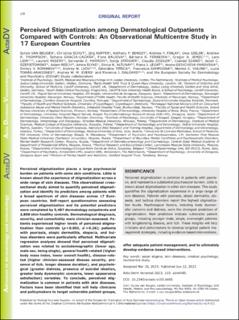Perceived Stigmatization among Dermatological Outpatients Compared with Controls: An Observational Multicentre Study in 17 European Countries
Van Beugen, Sylvia; Schut, Christina; Kupfer, Jörg; Bewley, Antony P.; Finlay, Andrew Y.; Gieler, Uwe; Thompson, Andrew R.; Grazia-Cazaña, Tamara; Balieva, Flora Nicol; Ferreira, Bárbara R; Jemec, Gregor B.; Lien, Lars; Misery, Laurent; Marron, Servando E.; Ständer, Sonja; Zeidler, Claudia; Szabó, Csanád; Szepietowski, Jacek C.; Reich, Adam; Elyas, Amna; Altunay, Ilknur K.; Legat, Franz J.; Grivcheva-Panovska, Vesna; Romanov, Dmitry V.; Lvov, Andrey N.; Titeca, Géraldine; Sampogna, Francesca; Vulink, Nienke C.; Tomás-Aragones, Lucia; Evers, Andrea W M; Dalgard, Florence
Peer reviewed, Journal article
Published version

Permanent lenke
https://hdl.handle.net/11250/3109455Utgivelsesdato
2023Metadata
Vis full innførselSamlinger
Sammendrag
Perceived stigmatization places a large psychosocial burden on patients with some skin conditions. Little is known about the experience of stigmatization across a wide range of skin diseases. This observational cross-sectional study aimed to quantify perceived stigmatization and identify its predictors among patients with a broad spectrum of skin diseases across 17 European countries. Self-report questionnaires assessing perceived stigmatization and its potential predictors were completed by 5,487 dermatology outpatients and 2,808 skin-healthy controls. Dermatological diagnosis, severity, and comorbidity were clinician-assessed. Patients experienced higher levels of perceived stigmatization than controls (p < 0.001, d = 0.26); patients with psoriasis, atopic dermatitis, alopecia, and bullous disorders were particularly affected. Multivariate regression analyses showed that perceived stigmatization was related to sociodemographic (lower age, male sex, being single), general health-related (higher body mass index, lower overall health), disease-related (higher clinician-assessed disease severity, presence of itch, longer disease duration), and psychological (greater distress, presence of suicidal ideation, greater body dysmorphic concerns, lower appearance satisfaction) variables. To conclude, perceived stigmatization is common in patients with skin diseases. Factors have been identified that will help clinicians and policymakers to target vulnerable patient groups, offer adequate patient management, and to ultimately develop evidence-based interventions.
